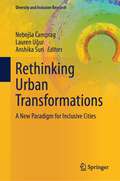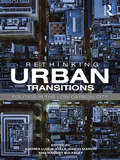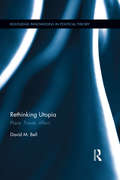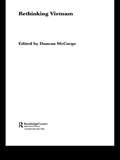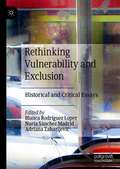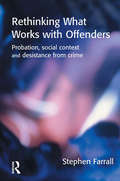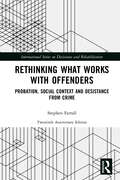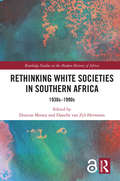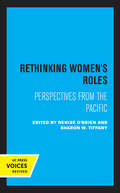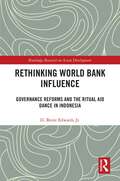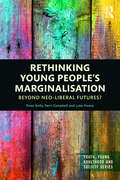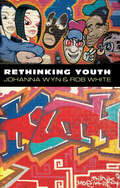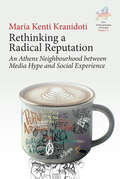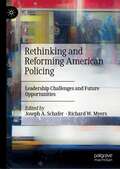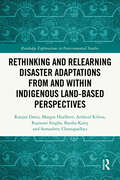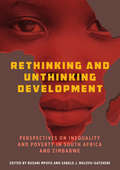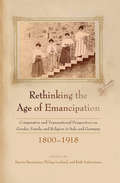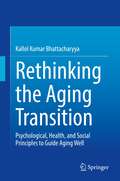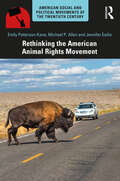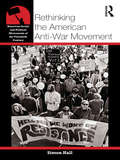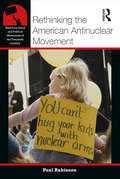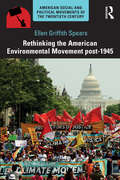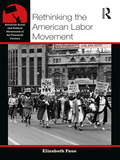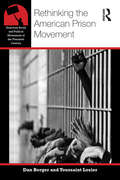- Table View
- List View
Rethinking Urban Transformations: A New Paradigm for Inclusive Cities (Diversity and Inclusion Research)
by Nebojša Čamprag Lauren Uğur Anshika SuriThis edited volume delves into the intricate challenges that cities face in the midst of evolving socio-political, economic, and environmental landscapes. With a focus on inclusivity and diversity, the book thoroughly examines the transformation of urban systems and their manifestations within broader spatial contexts. Employing a trans- and interdisciplinary approach, the editors have strategically curated diverse research clusters to address key aspects of inclusive urban transformation from multiple perspectives. These clusters explore alternative paradigms for sustainable urban transformation, the dynamics of city regions, inclusive tourism development, the de-contestation of urban heritage to diversify urban identities, and inclusive intersectional city-making practices. By fostering collaboration and cross-pollination among these clusters, the volume fosters a transdisciplinary understanding of inclusive and sustainable urban transformation, facilitating the development of more holistic approaches in conceptualizing and promoting inclusive urban theory and praxis.
Rethinking Urban Transitions: Politics in the Low Carbon City
by Harriet Bulkeley Simon Marvin Andrés Luque-AyalaRethinking Urban Transitions provides critical insight for societal and policy debates about the potential and limits of low carbon urbanism. It draws on over a decade of international research, undertaken by scholars across multiple disciplines concerned with analysing and shaping urban sustainability transitions. It seeks to open up the possibility of a new generation of urban low carbon transition research, which foregrounds the importance of political, geographical and developmental context in shaping the possibilities for a low carbon urban future. The book’s contributions propose an interpretation of urban low carbon transitions as primarily social, political and developmental processes. Rather than being primarily technical efforts aimed at measuring and mitigating greenhouse gases, the low carbon transition requires a shift in the mode and politics of urban development. The book argues that moving towards this model requires rethinking what it means to design, practise and mobilize low carbon in the city, while also acknowledging the presence of multiple and contested developmental pathways. Key to this shift is thinking about transitions, not solely as technical, infrastructural or systemic shifts, but also as a way of thinking about collective futures, societal development and governing modes – a recognition of the political and contested nature of low carbon urbanism. The various contributions provide novel conceptual frameworks as well as empirically rich cases through which we can begin to interrogate the relevance of socio-economic, political and developmental dimensions in the making or unmaking of low carbon in the city. The book draws on a diverse range of examples (including ‘world cities’ and ‘ordinary cities’) from North America, South America, Europe, Australia, Africa, India and China, to provide evidence that expectations, aspirations and plans to undertake purposive socio-technical transitions are both emerging and encountering resistance in different urban contexts. Rethinking Urban Transitions is an essential text for courses concerned with cities, climate change and environmental issues in sociology, politics, urban studies, planning, environmental studies, geography and the built environment.
Rethinking Utopia: Place, Power, Affect (Routledge Innovations in Political Theory)
by David M. BellOver five hundred years since it was named, utopia remains a vital concept for understanding and challenging the world(s) we inhabit, even in – or rather because of – the condition of ‘post-utopianism’ that supposedly permeates them. In Rethinking Utopia David M. Bell offers a diagnosis of the present through the lens of utopia and then, by rethinking the concept through engagement with utopian studies, a variety of ‘radical’ theories and the need for decolonizing praxis, shows how utopianism might work within, against and beyond that which exists in order to provide us with hope for a better future. He proposes paying a ‘subversive fidelity’ to utopia, in which its three constituent terms: ‘good’ (eu), ‘place’ (topos), and ‘no’ (ou) are rethought to assert the importance of immanent, affective relations. The volume engages with a variety of practices and forms to articulate such a utopianism, including popular education/critical pedagogy; musical improvisation; and utopian literature. The problems as well as the possibilities of this utopianism are explored, although the problems are often revealed to be possibilities, provided they are subject to material challenge. Rethinking Utopia offers a way of thinking about (and perhaps realising) utopia that helps overcome some of the binary oppositions structuring much thinking about the topic. It allows utopia to be thought in terms of place and process; affirmation and negation; and the real and the not-yet. It engages with the spatial and affective turns in the social sciences without ever uncritically being subsumed by them; and seeks to make connections to indigenous cosmologies. It is a cautious, careful, critical work punctuated by both pessimism and hope; and a refusal to accept the finality of this or any world.
Rethinking Vietnam (Rethinking Southeast Asia)
by Duncan McCargoA uniquely comprehensive overview of a fascinating and rapidly changing country, dealing with the politics, economics, society and foreign policy of Vietnam from the Doi Moi reforms of market socialism in 1986 to the present day. Drawing on fieldwork and analysis by an international team of specialists this book covers all aspects of contemporary Vietnam including recent history, the political economy, the reform process, education, health, labour market, foreign direct investment and foreign policy. The contributors show how the blurring of old and new pressures and traditions within Vietnam requires a more complex analysis of the country than might initially be assumed.
Rethinking Vulnerability and Exclusion: Historical and Critical Essays
by Blanca Rodríguez Lopez Nuria Sánchez Madrid Adriana ZaharijevićThis volume offers novel and provocative insights into vulnerability and exclusion, two concepts crucial for the understanding of contemporary political agency. In twelve critical essays, the contributors explore the dense theoretical content, complex histories and conceptual intersection of vulnerability and exclusion. A rich array of topics are covered as the volume searches for the ways that vulnerable and excluded groups relate to each other, where the boundary between the excluded and the included arises, and what the stakes of ‘invulnerability’ might be. Drawing on the works of Hegel (via Judith Butler), Helmuth Plessner and Hannah Arendt to situate the project in a solid historical context, the volume likewise tackles pressing and contemporary issues such as the state of human capital under neoliberalism, the flawed nature of democracy itself, and the vulnerability inherent in extreme precarity, extreme violence, and interdependence. The contributions come from philosophers with a range of backgrounds in social philosophy and critical social sciences, who use related conceptual tools to tackle the political challenges of the 21st century. Together, they present a ground-breaking overview of the main challenges which social exclusion presents to contemporary global societies.
Rethinking What Works with Offenders: Probation, Social Context And Desistance From Crime (International Series On Desistance And Rehabilitation Ser.)
by Stephen FarrallThis important and original new book reports on a major investigation of the outcomes of probation supervision, is concerned with the key question of what works in probation, and comes at an important moment of change and development for the probation service in the UK. Unlike previous studies which have relied mostly on official data, this book makes use of over 200 interviews with men and women on probation, and their supervising Probation Officers. Rethinking What Works with Offenders has the following objectives: to understand probation work from the perspectives of those who deliver it and those to whom it is delivered to study probation intervention as a whole (in particular the probation order) rather than specific aspects to locate probation work in the wider social contexts of those on probation to analyse how probation works, and to reconceptualise probation outcomes in terms of degrees of success rather than as 'successful' or 'unsuccessful' to assess the policy implications of these conclusions This book presents an important and challenging range of findings on 'what works' in probation and with offenders, and will be essential reading for anybody professionally concerned with the present and future of probation. raises central issues at a critical time for the reorganised National Probation Servicebased on extensive research, including 200+ interviewsessential reading for anybody interested in 'what works' in probation
Rethinking What Works with Offenders: Probation, Social Context and Desistance from Crime (International Series on Desistance and Rehabilitation)
by Stephen FarrallWhen it was published twenty years ago, Rethinking What Works with Offenders made a major contribution to criminological knowledge on why people stopped offending, and the impact the probation service had on the desistance process. Unlike other studies that had relied on official conviction data, it was the first to make use of self-reported data, including interviews with men and women on probation, and their supervising Probation Officers. It reconceptualised probation outcomes in terms of degrees of success rather than as 'successful' or 'unsuccessful' and offered important policy implications of these conclusions. The Twentieth Anniversary edition contains the original text along with a new Foreword by Shadd Maruna and Fergus McNeill, locating the book historically and assessing its continued importance to Criminology. It also includes a new chapter by the author reporting on the key findings of the follow-up interviews in 2004 and 2010-12, reflecting on key developments in the field and developing a theory of assisted desistance. Furthermore, it features four new commentaries from Mark Halsey, Isabelle F.-Dufour, Martine Herzog-Evans and José Cid reflecting on the importance and legacy of the book. This book presents an important and challenging range of findings on 'what works' in probation and with offenders and remains essential reading for anybody professionally concerned with the present and future of probation.
Rethinking White Societies in Southern Africa: 1930s–1990s
by Danelle Van Zyl-HermannThis book showcases new research by emerging and established scholars on white workers and the white poor in Southern Africa. Rethinking White Society in Southern Africa challenges the geographical and chronological limitations of existing scholarship by presenting case studies from Angola, Mozambique, South Africa, Zambia and Zimbabwe tracking the fortunes of nonhegemonic whites during the era of white minority rule. Arguing against prevalent understandings of white society as uniformly wealthy or culturally homogeneous during this period, it demonstrates that social class remained a salient element throughout the twentieth century, how Southern Africa’s white societies were often divided and riven with tension, and how the resulting social, political and economic complexities animated white minority regimes in the region. Addressing themes such as the class-based disruption of racial norms and practices; state surveillance and interventions towards nonhegemonic whites, and its failures; and the opportunities and limitations of physical and social mobility, the volume mounts a forceful argument for the regional consideration of white societies in this historical context. Centrally, it extends the path-breaking insights emanating from scholarship on racialized class identities from North America to the African context to argue that race and class cannot be considered independently in Southern Africa. This book will be of interest to scholars and students of southern African studies, African history, and the history of race.
Rethinking Women's Roles: Perspectives from the Pacific
by Denise O’Brien Sharon W. TiffanyThis title is part of UC Press's Voices Revived program, which commemorates University of California Press’s mission to seek out and cultivate the brightest minds and give them voice, reach, and impact. Drawing on a backlist dating to 1893, Voices Revived makes high-quality, peer-reviewed scholarship accessible once again using print-on-demand technology. This title was originally published in 1984.
Rethinking World Bank Influence: Governance Reforms and the Ritual Aid Dance in Indonesia (Routledge Research on Asian Development)
by D. Brent Edwards Jr.Why is it so hard for international development organizations—even ones as well-resourced and influential as the World Bank—to generate and sustain change in the way things are done in those countries where they work? Despite what, in many cases, is decades of investment and effort, why do partner governments continue to engage in those traditional patterns and styles of public service management that international development organizations have sought to supplant with methods that are supposedly more accountable, efficient, and effective? This book provides an answer to these questions. However, rather than pathologizing partner governments as the source of the problem—that is, rather than maintaining the distinction between doctor (international development organizations) and patient (partner governments), wherein the patient is seen as unwilling to take their medicine (enacting "good governance" practices)—this book instead reframes the relationship. The central argument is, first, that the programs and projects of international organizations are introduced into and are constrained by multiple layers of ritual governance, that is, performative acts and cultural logics that intersect with and reinforce the political, economic, and social structures in and through which they operate. As is shown, the contextual factors that guide governance practices are largely beyond the reach of the international development organizations; the relevant logics have their roots in state ideology but also extend back to the colonial logics that continue to operate at the heart of the state apparatus. The second the central argument is that international aid organizations and the governments with which they work are engaged in a "ritual aid dance" where each actor plays a part but does not (and cannot) acknowledge the ways that it depends on the other for its own gain. This relationship can be considered a dance because each participant responds to and needs the other, and because both sides do so in ways that are carefully choreographed, with the overall trajectory or contours of the dance being more or less known to the participants. These arguments are based on research on the World Bank’s efforts over the course of several decades to encourage, through its financing, projects, and technical assistance, the implementation of social sector reform in Indonesia related to decentralization, community participation, and school-based management.
Rethinking Young People’s Marginalisation: Beyond neo-Liberal Futures? (Youth, Young Adulthood and Society)
by Peter Kelly Luke Howie Perri CampbellIn the 21st century myriad earth systems – atmospheric systems, ocean systems, land systems, neo-Liberal capitalism – are in crisis. These crises are deeply related. Taking diverse and multiple forms, they have diverse and multiple consequences and are evidenced in such things as war, everyday violence, hate and extremism, global flows of millions of the dispossessed and homeless; and in the precarious, uncertain, and marginal existence of millions more. Rethinking Young People’s Marginalisation is concerned with the experience, affect, and effects of these earth systems crises on: • young people’s life chances, life choices, and life courses • young people’s engagement with education, training, and work • the character of young people’s being and becoming, their gendered embodiment, their participation in cultures of democracy, their resilience, and their marginalisation. Indeed, in setting out to rethink young people’s marginalisation, this insightful volume makes a contribution to troubling key concepts in Youth Studies, primarily: structure and agency; transitions and pathways; gender and embodiment, citizenship, risk, and resilience. It does this by drawing on a variety of critical, theoretical traditions, including Bauman’s engagement with the ambivalence of the human condition; Foucault’s studies of mentalities of government and genealogies of the subject; the critique of the politics of disposability and violence of neo-Liberalism undertaken by Giroux, and the authors of Kilburn Manifesto; Braidotti’s vitalist posthumanism; and Haraway’s figure of the Chthulucene. Analysing the ways in which young people engage in and develop new cultures of democracy, Rethinking Young People’s Marginalisation will appeal to postgraduate students and postdoctoral researchers interested in fields such as Youth Studies, Youth Sociology, Education Studies, and Critical Social Theory.
Rethinking Youth: Rethinking Change And Inequality In The Lives Of Young People (Studies In Society Ser.)
by Rob White Johanna WynYoung people grow up in varied circumstances with different priorities and perspectives. While youth does not exist as a single group we need to understand what is happening in young people's lives. Rethinking Youth challenges the conventional wisdoms surrounding the position and opportunities of young people today and provides a systematic overview of the major perspectives in youth studies.The authors demonstrate how the concept of youth involves a tension between the social significance of age, which gives young people a common status, and the significance of social divisions. Drawing upon studies from different societies, they examine debates surrounding youth and economy, youth development, youth subcultures, youth transitions and youth marginalisation.Rethinking Youth offers a provocative critique of mainstream conceptions of youth, the programs and strategies designed for 'at risk' young people, and policy development in youth affairs. It calls for greater sensitivity to the complexities of youth, and greater emphasis on democracy and equality in dealing with the problems experienced by young people in a rapidly changing world.Johanna Wyn is Director of the Youth Research Centre at the University of Melbourne. Rob White lectures in Criminology at the University of Melbourne.
Rethinking a Radical Reputation: An Athens Neighbourhood between Media Hype and Social Experience (New Anthropologies of Europe: Perspectives and Provocations)
by Maria Kenti-Kranidioti Kenti-KranidiotiKnown for its anarchist and leftist movements, its uprisings and its vibrant counterculture, Exarcheia has long been a symbol of resistance and political activism in Greece. Through the voices and experiences of those who live, work and move through Exarcheia, this book delves into Athens’ most contested neighbourhood – both its visible, striking elements and the unseen, elusive forces that linger in whispers, silences and memories. It unravels the tensions and contradictions of a place where beauty and resistance, decay and resilience are coexistent. Rather than reinforcing or dismissing its clichés and stereotypes, this exploration reveals the layered histories and political narratives that shape Exarcheia’s past, present and future.
Rethinking and Reforming American Policing: Leadership Challenges and Future Opportunities
by Joseph A. Schafer Richard W. MyersPolicing in the US and many western nations is in an era of crisis, facing extensive calls for reformation and change. This edited book outlines the major challenges and changes needed to achieve a more stable future for the policing profession and police organizations. The chapters come from innovative police leaders and officers as well as academics with subject matter expertise, to provide insight into how reform can be done with the police. It focusses on how leaders should understand and approach their role during times of instability and uncertainty. It starts with an examination of how policing reached this state of crisis and discusses some interviews conducted with police leaders, particularly chiefs as agents of change and reform. This is followed by chapters from several veteran police leaders and personnel describing some of the factors that brought policing to this critical time of change and reform, how has policing evolved in the late 20th and early 21st centuries, and how that impacts the current environment, and some potential strategies to create meaningful change while considering unintended consequences. The following chapters from academics seek to define paths that policing can take toward needed changes that will increase legitimacy, trust, and equality of policing services. It speaks to students, academics and professionals interested in police organization and administration, police leadership, and contemporary issues in policing and criminal justice.
Rethinking and Relearning Disaster Adaptations from and within Indigenous Land-Based Perspectives (Routledge Explorations in Environmental Studies)
by Ranjan Datta Margot Hurlbert Arifatul Kibria Rajmoni Singha Barsha Kairy Somashree ChattapadhyaThis book offers a critical exploration into Indigenous knowledge systems, particularly focusing on Indigenous land-based knowledge and practice in reshaping disaster adaptations.Drawing from Indigenous communities in Bangladesh, this book challenges transformational approaches to disaster resilience by centering on land-based perspectives intrinsic to Indigenous cultures. The book showcases how Indigenous and land-based minority communities in Bangladesh have historically coped with and adapted to environmental challenges. It navigates beyond the Eurocentric paradigm, acknowledging the richness of traditional Indigenous land-based knowledge and practice embedded in the relationship between Indigenous peoples, land-based minority communities, and their natural environments. The book focuses on the interconnectedness of Indigenous land-based knowledge, culture, and sustainable practices, providing a blueprint for rethinking contemporary disaster adaptation strategies. By relearning from Indigenous land-based perspectives, readers gain invaluable insights into holistic, community-based approaches prioritizing harmony with nature over technological fixes. Through Indigenist, decolonial, relational, and feminist theoretical research frameworks, the book advocates for a paradigm shift in disaster management, emphasizing the importance of respecting and integrating Indigenous land-based solutions.Rethinking and Relearning Disaster Adaptations from and within Indigenous Land-Based Perspectives emerges as a crucial resource for scholars, policymakers, and practitioners seeking to foster resilience through a more inclusive and culturally sensitive lens.
Rethinking and Unthinking Development: Perspectives on Inequality and Poverty in South Africa and Zimbabwe
by Sabelo J. Ndlovu-Gatsheni Busani MpofuDevelopment has remained elusive in Africa. Through theoretical contributions and case studies focusing on Southern Africa’s former white settler states, South Africa and Zimbabwe, this volume responds to the current need to rethink (and unthink) development in the region. The authors explore how Africa can adapt Western development models suited to its political, economic, social and cultural circumstances, while rejecting development practices and discourses based on exploitative capitalist and colonial tendencies. Beyond the legacies of colonialism, the volume also explores other factors impacting development, including regional politics, corruption, poor policies on empowerment and indigenization, and socio-economic and cultural barriers.
Rethinking the Age of Emancipation: Comparative and Transnational Perspectives on Gender, Family, and Religion in Italy and Germany, 1800–1918
by Martin Baumeister Philipp Lenhard Ruth NattermannSince the end of the nineteenth century, traditional historiography has emphasized the similarities between Italy and Germany as “late nations”, including the parallel roles of “great men” such as Bismarck and Cavour. Rethinking the Age of Emancipation aims at a critical reassessment of the development of these two “late” nations from a new and transnational perspective. Essays by an international and interdisciplinary group of scholars examine the discursive relationships among nationalism, war, and emancipation as well as the ambiguous roles of historical protagonists with competing national, political, and religious loyalties.
Rethinking the Aging Transition: Psychological, Health, and Social Principles to Guide Aging Well
by Kallol Kumar BhattacharyyaThe transitional phase from pre-older adult to older adult affects the wellbeing of the concerned person economically, physically, and psychologically. This book is a description of the aging transition and discusses various psychological, health, and social challenges faced by older adults globally. It also offers a comparative study on the lifestyles of older adults in India and the United States.Although there is no consensus yet on an all-encompassing theory of aging, this book centers on various theories related to aging processes in an effort to advance discussion on different aspects of aging. Various theoretical formulations, such as person-centered, Hinduism, biopsychosocial, and positive psychology, guided the author to address the topics covered in this volume.Aging and PhysiciansAging and RetirementAging, Caregiving, and COVID-19Aging and DiversityAging and LongevityAging, Disease Prevention, and TechnologyAging and SpiritualityThrough the chapters, the author builds an understanding of the fundamental relation of aging with various health and socioeconomic factors, and also emphasizes a person-centered, holistic approach that values personal autonomy, choice, comfort, dignity, and purposeful living to support aging well. Rethinking the Aging Transition: Psychological, Health, and Social Principles to Guide Aging Well has academic value from a multicultural perspective that would be of benefit to graduate and undergraduate students in gerontology and other disciplines that study aging and older adult populations. With the main aim of raising awareness, this book is an important resource for a diverse group of populations globally, including clinical and non-clinical caregivers, other health(care) professionals, and policy-makers.
Rethinking the American Animal Rights Movement (American Social and Political Movements of the 20th Century)
by Emily Patterson-Kane Michael P. Allen Jennifer EadieAlong with Civil Rights and Women’s liberation, Animal Rights became one of leading social moments of the twentieth century. This book critically reviews all principal contributions to the American animal rights debate by activists, campaigners, academics, and lawyers, while placing animal rights in context with other related and competing movements. Rethinking the American Animal Rights Movement examines the strategies employed within the movement to advance its goals, which ranged from public advocacy and legal reforms to civil disobedience, vigilantism, anarchism, and even "terrorism." It summarizes key theoretical and legal frameworks that inspired those strategies, as well as the ideological motivations of the movement. It highlights the irreconcilable tension between moral and legal rights verses "humane treatment of animals" as prescribed by advocates of animal welfarism. The book also looks back to the nineteenth century origins of the movement, examining its appeal to a sentimentalist conception of rights standing in marked contrast with twentieth century rights theory. After providing an extensive social history of the twentieth century movement, the book subsequently offers a diagnosis of why it stalled at the turn of millennium in its various efforts to advance the cause of nonhuman animals. This diagnosis emphasizes the often-contradictory goals and strategies adopted by the movement in its different phases and manifestations across three centuries. The book is unique in presenting students, activists, and scholars with a history and critical discussion of its accomplishments, failures, and ongoing complexities faced by the American animal rights movement.
Rethinking the American Anti-War Movement (American Social and Political Movements of the 20th Century)
by Simon HallBetween 1965 and 1973, hundreds of thousands of ordinary Americans participated in one of the most remarkable and significant people's movements in American history. Through marches, rallies, draft resistance, teach-ins, civil disobedience, and non-violent demonstrations at both the national and local levels, Americans vehemently protested the country's involvement in the Vietnam War. Rethinking the American Anti-War Movement provides a short, accessible overview of this important social and political movement, highlighting key events and key figures, the movement's strengths and weaknesses, how it intersected with other social and political movements of the time, and its lasting effect on the country. The book is perfect for anyone wanting to obtain an introduction to the Anti-War movement of the twentieth century.
Rethinking the American Anti-War Movement (American Social and Political Movements of the 20th Century)
by Simon HallBetween 1965 and 1973, hundreds of thousands of ordinary Americans participated in one of the most remarkable and significant people's movements in American history. Through marches, rallies, draft resistance, teach-ins, civil disobedience, and non-violent demonstrations at both the national and local levels, Americans vehemently protested the country's involvement in the Vietnam War. Rethinking the American Anti-War Movement provides a short, accessible overview of this important social and political movement, highlighting key events and key figures, the movement's strengths and weaknesses, how it intersected with other social and political movements of the time, and its lasting effect on the country. The book is perfect for anyone wanting to obtain an introduction to the Anti-War movement of the twentieth century.
Rethinking the American Antinuclear Movement (American Social and Political Movements of the 20th Century)
by Paul RubinsonThe massive movement against nuclear weapons began with the invention of the atomic bomb in 1945 and lasted throughout the Cold War. Antinuclear protesters of all sorts mobilized in defiance of the move toward nuclear defense in the wake of the Cold War. They influenced U.S. politics, resisting the mindset of nuclear deterrence and mutually-assured destruction. The movement challenged Cold War militarism and restrained leaders who wanted to rely almost exclusively on nuclear weapons for national security. Ultimately, a huge array of activists decided that nuclear weapons made the country less secure, and that, through testing and radioactive fallout, they harmed the very people they were supposed to protect. Rethinking the American Antinuclear Movement provides a short, accessible overview of this important social and political movement, highlighting key events and figures, the strengths and weaknesses of the activists, and its lasting effects on the country. It is perfect for anyone wanting to obtain an introduction to the American antinuclear movement and the massive reach of this transnational concern.
Rethinking the American Environmental Movement post-1945 (American Social and Political Movements of the 20th Century)
by Ellen SpearsRethinking the American Environmental Movement post-1945 turns a fresh interpretive lens on the past, drawing on a wide range of new histories of environmental activism to analyze the actions of those who created the movement and those who tried to thwart them. Concentrating on the decades since World War II, environmental historian Ellen Griffith Spears explores environmentalism as a "field of movements" rooted in broader social justice activism. Noting major legislative accomplishments, strengths, and contributions, as well as the divisions within the ranks, the book reveals how new scientific developments, the nuclear threat, and pollution, as well as changes in urban living spurred activism among diverse populations. The book outlines the key precursors, events, participants, and strategies of the environmental movement, and contextualizes the story in the dramatic trajectory of U.S. history after World War II. The result is a synthesis of American environmental politics that one reader called both "ambitious in its scope and concise in its presentation." This book provides a succinct overview of the American environmental movement and is the perfect introduction for students or scholars seeking to understand one of the largest social movements of the twentieth century up through the robust climate movement of today.
Rethinking the American Labor Movement
by Elizabeth FaueRethinking the American Labor Movement tells the story of the various groups and incidents that make up what we think of as the "labor movement." While the efforts of the American labor force towards greater wealth parity have been rife with contention, the struggle has embraced a broad vision of a more equitable distribution of the nation’s wealth and a desire for workers to have greater control over their own lives. In this succinct and authoritative volume, Elizabeth Faue reconsiders the varied strains of the labor movement, situating them within the context of rapidly transforming twentieth-century American society to show how these efforts have formed a political and social movement that has shaped the trajectory of American life. Rethinking the American Labor Movement is indispensable reading for scholars and students interested in American labor in the twentieth century and in the interplay between labor, wealth, and power.
Rethinking the American Prison Movement (American Social and Political Movements of the 20th Century)
by Dan Berger Toussaint LosierRethinking the American Prison Movement provides a short, accessible overview of the transformational and ongoing struggles against America’s prison system. Dan Berger and Toussaint Losier show that prisoners have used strikes, lawsuits, uprisings, writings, and diverse coalitions with free-world allies to challenge prison conditions and other kinds of inequality. From the forced labor camps of the nineteenth century to the rebellious protests of the 1960s and 1970s to the rise of mass incarceration and its discontents, Rethinking the American Prison Movement is invaluable to anyone interested in the history of American prisons and the struggles for justice still echoing in the present day.
